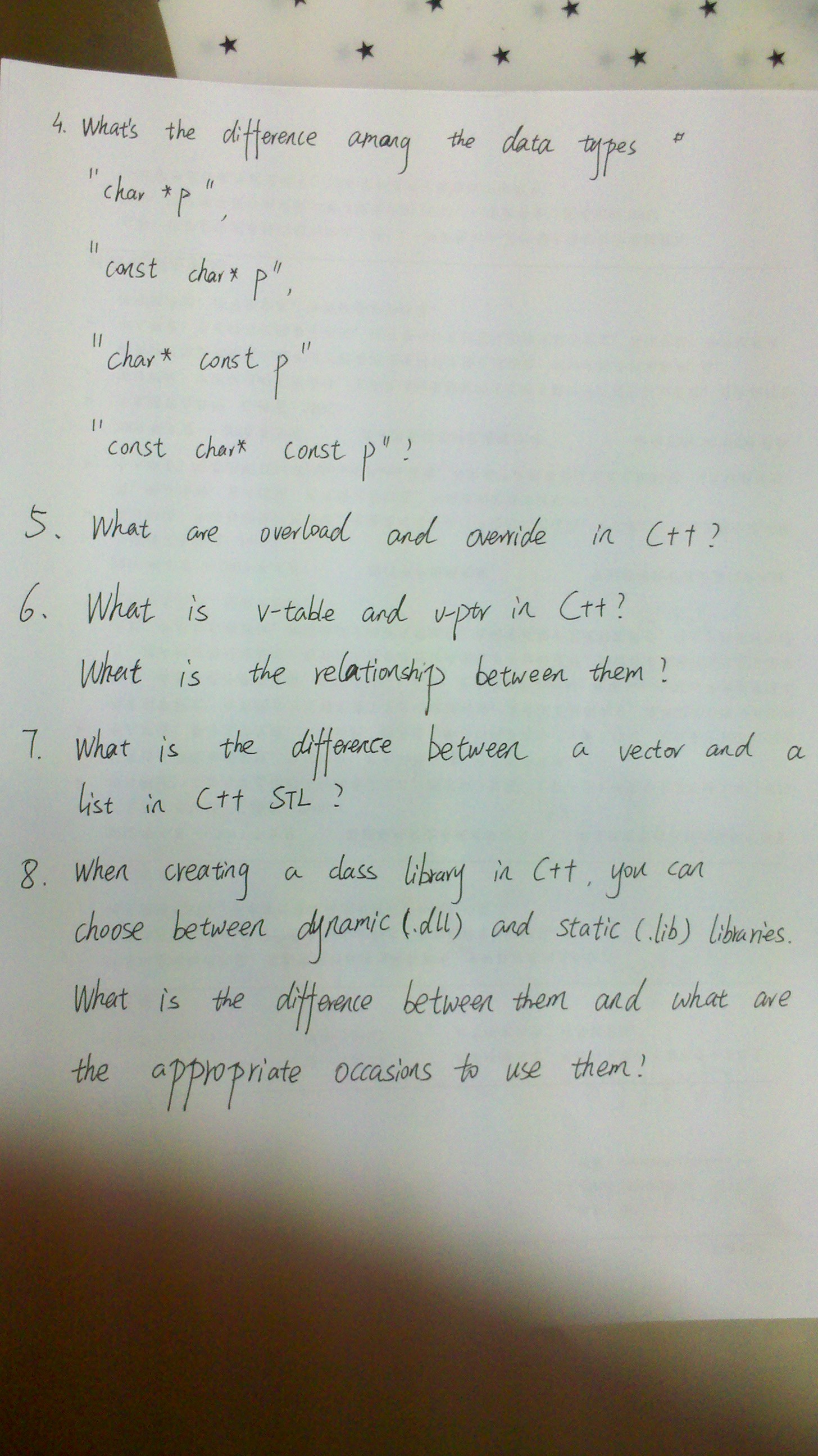算是复习一下C++的东西。
1. What is the output of the program below in a Win32 platform? (10 points)
void size_func(char a[]) { printf("%d\n", sizeof(a)); } int _tmain(int argc, _TCHAR* argv[]) { char str[] = "WelcomeToBJ"; char *p = str; void *m = malloc(100); int n = 10; printf("%d\n", sizeof(str)); printf("%d\n", sizeof(p)); printf("%d\n", sizeof(n)); printf("%d\n", sizeof(m)); size_func(str); return 0; }
The output is:
12
4
4
4
4
2. What are the outputs of Test() functions? Explain the reason for your answer. (10 points)
1.
void GetMemory(char *p) { p = (char *)malloc(100); } void Test(void) { char *str = NULL; GetMemory(str); strcpy(str, "Hello Beijing"); printf(str); }
2.
char *GetMemory(void) { char p[] = "Hello Beijing"; return p; } void Test(void) { char *str = NULL; str = GetMemory(); printf(str); }
3.
void GetMemory3(char **p, int num) { *p = (char *) malloc(num); } void Test3() { char *str = NULL; GetMemory3(&str, 100); strcpy(str, "Hello Beijing"); printf(str); }
4.
void Test4() { char *str = (char *)malloc(100); strcpy(str, "Hello"); free(str); if(str != NULL) { strcpy(str, "Beijing"); printf(str); } }
Answer:1.显然不对,GetMemory函数传参的时候只是将str的值(也就是一个地址)赋给了p,在函数里给p赋值不影响外面的str值,所以在strcpy()的时候会出错。
2. 函数中的p指向的字符串应为local variable,随着函数调用结束而释放。
(如果不是定义的字符串“char p[] = "Hello Beijing";”, 而是定义的字符指针 char *p,那么可以正常执行。
因为初始化的字符串数组存储在栈中,可以改变其值。初始化的字符串常量指针存储在静态常量区,不能修改其值。)
3. 可以正常输出"Hello Beijing"
4. 输出为:"Beijing",在内存被free之后str并不等于NULL,但是str也是野指针,并不安全,可能会覆盖其他数据,所以一般会将指针free后直接将指针赋为空。
3. What is the output of the program below? (10 points)
class IGT { public: void x() {cout << "class IGT, function x"<< endl;} virtual void y() {cout << "class IGT, function y" << endl;} }; class ADV : public IGT { public: virtual void x() { cout << "class ADV, function x" << endl;} void y() { cout << "class ADV, function y" << endl;} }; class CTA : public ADV { public: void x() {cout << "class CTA, function x" << endl;} void y() {cout << "class CTA, function y" << endl;} }; int tmain2() { IGT* igt1 = new ADV; IGT* igt2 = new CTA; ADV* adv = new CTA; igt1->x(); igt1->y(); igt2->x(); igt2->y(); adv->x(); adv->y(); delete igt1; igt1 = NULL; delete igt2; igt2 = NULL; delete adv; adv = NULL; return 0; }
The output :
class IGT, function x
class ADV, function y
class IGT, function x
class CTA, function y
class CTA, function x
class CTA, function y
